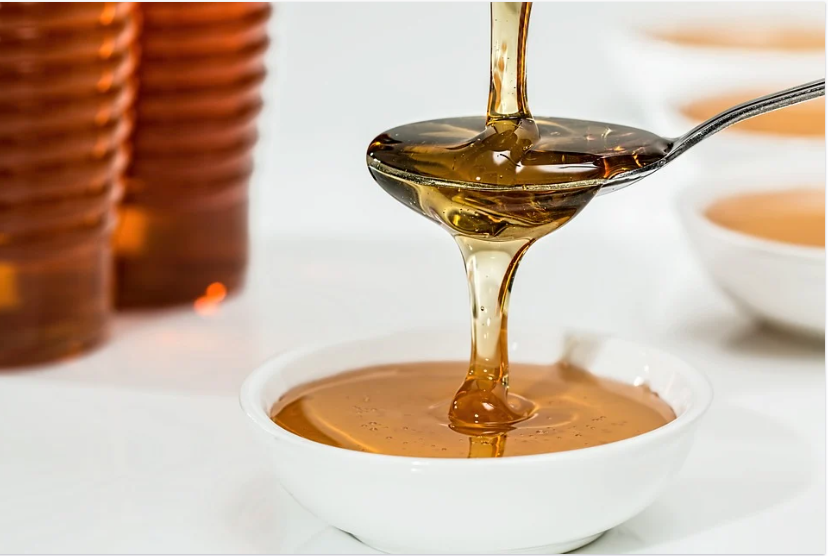Honey
Honey is a sweet-tasting liquid that bees produce from the nectar of plant flowers. There are three hundred and twenty different types of honey that differ in color, flavor, and aroma. Honey mainly contains sugar and a group of amino acids, vitamins and minerals. Such as: zinc, iron and antioxidants. Honey is not only used as a natural sweetener, but also as an anti-inflammatory, antioxidant and antibacterial. Honey is used to treat coughs and is also used topically to treat burns and wounds.
It should be noted that this liquid is used in the treatment of diabetes, high cholesterol, and asthma, as well as in the treatment of diarrhea, mouth ulcers resulting from cancer treatment, stomach ulcers caused by stomach germs, and to help heal wounds after tonsils. Elimination. Honey is used as a source of sugar during intense exercise or in malnourished people.
Benefits of honey for the face
Some of the chemicals in honey can kill certain types of bacteria and fungi when applied to the skin. Additionally, honey keeps the skin hydrated, reduces dryness, and contains nutrients that help speed up the healing process. Here are the benefits of honey for skin:
- Contributes to wound healing: The use of lotions or mixtures that contain honey improves the wound healing process. Such as surgical wounds, leg ulcers, boils and burns, in addition, honey relieves odor and pus, cleanses the wound and helps reduce inflammation, pain and the time needed for wound healing.
- Helps Treat Burns: Several studies have shown that applying honey topically to burned skin can reduce the rate of inflammation in the area. A report in the New Zealand Medical Journal showed that honey is useful in the treatment of first and second degree burns. Eight studies with 624 participants, and most of the studies were based on the use of untreated honey, with the wound covered with medical gauze, and it was also shown in a 2011 report that honey can help treat burns by stimulate the immune system.
- Used to treat eczema: Honey is a natural antibacterial and anti-inflammatory that has been used for centuries to treat wounds. When applied directly to eczema, it can help reduce infection while keeping skin hydrated and helping to speed up the healing process.
- Used in the treatment of psoriasis: this disease is known as an autoimmune disease that leads to the rapid growth of skin cells and their scaling at a higher rate than normal, which can lead to inflammation of the skin and can form. uncomfortable. There are many treatments that are used to treat psoriasis. Including the use of honey topically. When honey is applied to pimples caused by psoriasis, it combines with substances secreted from the wounds to produce hydrogen peroxide. This limits the growth of bacteria and speeds up the wound healing process.
- Helps reduce facial marks: As honey helps the body to heal and heal, it can help reduce facial marks or scars caused by acne, and this liquid can be used topically on the places where the marks appear on the face. skin, and can also be used daily. Or a bit like a paste distributed on the skin, and face masks containing honey can be used, and it should be noted that studies on the properties of honey to help reduce skin defects are still scarce.
- Used as an antibacterial: In a study published by the Academic Medical Center, medicinal honey was found to; Any honey produced under special conditions manages to be antimicrobial, reducing infection; Even if the cause is drug-resistant bacteria, these results make honey a suitable treatment for rashes where catheters are used on the body. It is worth noting that honey can be used to treat diaper rash. According to a study published in 2004, after using a mixture of honey, olive oil, and beeswax on 12 children for seven consecutive days, there was an improvement in diaper rash.
The nutritional value of honey
The table below shows the nutrients available in 21 grams; The equivalent of a tablespoon of pure honey:
- Nutrient quantity
- Calories 64 calories
- Water 3.6ml
- Carbs 17.3 grams
- Sugars 17. 25g
- Calcium 1 milligram
- Iron 0.09mg
- Potassium 11 milligrams
- Vitamin C 0.1mg
Side effects of honey
Honey is not likely to cause an allergic reaction in most people, but using honey or any mixture containing it with caution is preferable if a person is allergic to pollen or bee venom, and is always recommended. . Make sure you are not allergic to honey; When testing it topically on a specific area of skin, it is also recommended to remove honey from the face before bedtime; This is because it can lead to a buildup of dust or debris on your skin, which can lead to skin irritation and acne breakouts. It is also advised to avoid giving honey, even in small amounts, to children under one year of age. This is because it can lead to serious infectious disease caused by Clostridium botulinum bacteria. It should be noted that some people may be allergic to pollen carried by bees, which may be present in honey, which can lead to allergic reactions. One of the signs of an allergic reaction to these pills. It is wheezing, dizziness, nausea, vomiting, sweating, loss of consciousness and a tingling sensation after its topical application.


Comments
Post a Comment